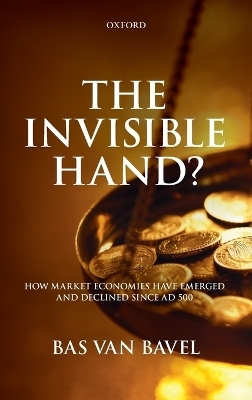
The Invisible Hand?
Oxford University Press (Verlag)
978-0-19-960813-3 (ISBN)
The Invisible Hand offers a radical departure from the conventional wisdom of economists and economic historians, by showing that 'factor markets' and the economies dominated by them -- the market economies -- are not modern, but have existed at various times in the past. They rise, stagnate, and decline; and consist of very different combinations of institutions embedded in very different societies. These market economies create flexibility and high mobility in the exchange of land, labour, and capital, and initially they generate economic growth, although they also build on existing social structures, as well as existing exchange and allocation systems. The dynamism that results from the rise of factor markets leads to the rise of new market elites who accumulate land and capital, and use wage labour extensively to make their wealth profitable. In the long term, this creates social polarization and a decline of average welfare. As these new elites gradually translate their economic wealth into political leverage, it also creates institutional sclerosis, and finally makes these markets stagnate or decline again. This process is analysed across the three major, pre-industrial examples of successful market economies in western Eurasia: Iraq in the early Middle Ages, Italy in the high Middle Ages, and the Low Countries in the late Middle Ages and the early modern period, and then parallels drawn to England and the United States in the modern period. These areas successively saw a rapid rise of factor markets and the associated dynamism, followed by stagnation, which enables an in-depth investigation of the causes and results of this process.
Bas van Bavel is distinguished professor of Transitions of Economy and Society at Utrecht University. He acts as the academic director of the Utrecht University interdisciplinary priority area -- Institutions for Open Societies -- and he is a member of the Royal Dutch Academy of Sciences. His research activities focus on reconstructing, analyzing, and explaining economic development and social change, emphasizing long-term transitions and regional diversity, and using comparative analysis -- both over time and across regions -- as the main tool. More specifically, he aims to find out why some societal arrangements are successful in generating wealth, equity and resilience, and others not, and what drives the formation of these arrangements.
1: Introduction: Markets in economics and history
2: Markets in an early medieval empire: Iraq, 500-1100
3: Markets in medieval city-states: the centre-north of Italy, 1000-1500
4: Markets in late medieval / early modern principalities: the Low Countries, 1100-1800
5: Epilogue: Markets in modern states: England, the United States and Western Europe, 1500-2000
6: Conclusion: The fundamental incompatibility of market economies with long-run prosperity
Bibliography
| Erscheinungsdatum | 07.07.2016 |
|---|---|
| Verlagsort | Oxford |
| Sprache | englisch |
| Maße | 161 x 241 mm |
| Gewicht | 658 g |
| Themenwelt | Geschichte ► Allgemeine Geschichte ► Mittelalter |
| Geschichte ► Allgemeine Geschichte ► Neuzeit (bis 1918) | |
| Geschichte ► Teilgebiete der Geschichte ► Wirtschaftsgeschichte | |
| Wirtschaft ► Volkswirtschaftslehre | |
| ISBN-10 | 0-19-960813-X / 019960813X |
| ISBN-13 | 978-0-19-960813-3 / 9780199608133 |
| Zustand | Neuware |
| Haben Sie eine Frage zum Produkt? |
aus dem Bereich


